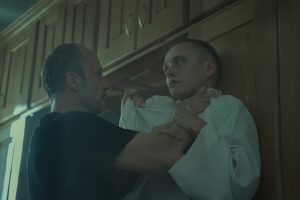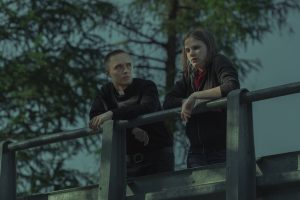“Corpus Christi” (“Boże Cialo”) (2019). Cast: Bartosz Bielenia, Aleksandra Konieczna, Eliza Rycembel, Tomasz Zietek, Barbara Kurzaj, Leszek Lichota, Zdislaw Wardejn, Lukasz Simlat. Director: Jan Komasa. Screenplay: Mateusz Pacewicz. Web site. Trailer.
Some of us are naturally inclined to feel the power of spirit, to experience its movement through us. As a consequence, we may well want to convey the essence of that divinity to others, especially those in need of comfort or guidance. But is it a practice for which we need the permission of authority figures? Or should we be free to express ourselves, regardless of whether we fulfill the “qualifications” supposedly required for carrying out this mission? Those are among the questions raised in the new fact-based Polish morality play, “Corpus Christi” (“Boże Cialo”).
Twenty-year-old juvenile detention inmate Daniel (Bartosz Bielenia) is a walking contradiction. In one moment, he can be as tough and gritty as the streets he comes from. In the next, however, he can be supremely blissful, even inspiring to others, especially when assisting the prison chaplain, Father Tomasz (Lukasz Simlat), in conducting mass. It’s strange how someone with such an inherently violent streak can find genuine peace and contentment through a religious experience, but Daniel genuinely does, something not lost on Fr. Tomasz. The cleric even suggests that his young follower may have a religious vocation in his future, despite the fact that the priesthood is out of the question in light of his criminal record.
Not long thereafter, Daniel is paroled, and, with Fr. Tomasz’s help, he lands a job at a sawmill in a remote community. However, upon viewing his new workplace, he realizes it’s not for him, particularly with the presence of ghosts from his past on site, raising the specter of retaliation against him from those he clashed with while incarcerated. Instead of reporting for work, he wanders into a nearby small town, where he comes upon the village parish. There he meets the church sexton, Lidia (Aleksandra Konieczna), and her daughter, Marta (Eliza Rycembel), both of whom he convinces he’s a newly ordained priest from Warsaw, a lie they readily believe, especially when he flashes a cleric’s collar he swiped from the prison chaplain.
[caption id="attachment_11292" align="aligncenter" width="350"] Former juvenile detention inmate Daniel (Bartosz Bielenia), an imposter posing as a stand-in priest in a small Polish town, packs the house of a dwindling congregation with his upbeat, impassioned style in the new fact-based drama, “Corpus Christi” (“Boże Cialo”). Photo courtesy of Film Movement.[/caption]
Former juvenile detention inmate Daniel (Bartosz Bielenia), an imposter posing as a stand-in priest in a small Polish town, packs the house of a dwindling congregation with his upbeat, impassioned style in the new fact-based drama, “Corpus Christi” (“Boże Cialo”). Photo courtesy of Film Movement.[/caption]
Before long, Lidia introduces Daniel to the parish’s ailing elderly priest (Zdislaw Wardejn). Given the pastor’s poor health, he’s in need of a break from his duties. And, with an apparent replacement fortuitously in his midst, he suggests that Daniel fill in for him while he’s recuperating. The imposter jumps at the opportunity, stepping in as the community’s new temporary cleric.
Despite a rocky start, Daniel soon slips into his new station quite comfortably. He abandons the standard, by-the-book liturgical practices he learned while serving with Fr. Tomasz, opting instead to implement his own form of ministering. He delivers impromptu, impassioned sermons and officiates masses in his own singular style, and, in no time, the paltry congregation swells as new churchgoers attend his unconventional and uplifting services. He also participates in nightly vigils held at a makeshift memorial for the seven victims of a horrific traffic accident, tenderly comforting bereaved family members, including Marta, who lost her brother in the incident.
Clearly, Daniel becomes a local sensation. In a community in need of spiritual rebirth and rejuvenation, the new young “priest” fills the bill perfectly. But not everyone is convinced; Lidia, for example, is suspect of his unorthodox style. She’s also somewhat skeptical about Daniel’s claim of being a legitimate cleric when she sees him taking what appears to be a more than passing interest in her daughter, advances to which Marta readily responds. But, given Daniel’s nature, such behavior is not surprising, especially in light of the hard partying ways and unabashed womanizing he partakes in during his time immediately after his release from prison.
[caption id="attachment_11293" align="aligncenter" width="350"] Would-be priest Daniel (Bartosz Bielenia) seeks divine guidance to retain his “post” when faced with challenges threatening to expose his imposter status in director Jan Komasa’s latest offering, “Corpus Christi” (“Boże Cialo”). Photo courtesy of Film Movement.[/caption]
Would-be priest Daniel (Bartosz Bielenia) seeks divine guidance to retain his “post” when faced with challenges threatening to expose his imposter status in director Jan Komasa’s latest offering, “Corpus Christi” (“Boże Cialo”). Photo courtesy of Film Movement.[/caption]
At the same time, though, Daniel also successfully manages to come across as the real deal, such as when he’s called upon to administer last rights to a dying woman. He also sets an example for others to follow when he extends heartfelt and much appreciated compassion to the ostracized widow (Barbara Kurzaj) of the deceased driver who lost control of his vehicle and killed the other accident victims. He even advocates for a proper burial for the departed motorist, seeking to replace the town folk’s scorn with mercy.
However, keeping up the façade proves to be increasingly difficult. Over time, Daniel runs afoul of an old nemesis, Pinczer (Tomasz Zietek), who threatens to blow the imposter’s cover. Then he engages in several tense encounters with the village’s mayor (Leszek Lichota), who also just happens to be the owner of a certain sawmill where a recently recruited employee failed to show up for work. And, with the looming possibility of a visit from the mayor’s friend, Fr. Tomasz, Daniel is faced with his biggest challenge at keeping his true identity secret. If divine intervention were ever called for, now would definitely be the time.
“Corpus Christi” raises a variety of questions about promoting faith, offering redemption, extending salvation and providing spiritual comfort – and who’s “legitimately” allowed to engage in such activities. Are these activities to be restricted to a select few, those who have been officially certified by a religious bureaucracy that, arguably, puts its own needs before those of its representatives and congregants? Or are they undertakings to be administered by those who possess the gifts needed to dispense them most effectively, particularly to those in greatest need? And should the ability to engage in such pursuits be qualified by one’s character and behavior, with rigid exclusions for such transgressions as criminal acts (including those for which a perpetrator has allegedly earned forgiveness by rightfully paying the requisite penance)?
Such issues are at the heart of Daniel’s odyssey, one that reveals his many different sides and tests him with a variety of intriguing challenges. And, as he progresses through it all, he frequently looks within for guidance, searching his thoughts, beliefs and intents for answers, for they will ultimately govern what he experiences. That’s because these elements provide the foundation of the conscious creation process, the philosophy that maintains we draw upon these intangibles in materializing our external existence. Even if he is unaware of this practice, he nevertheless seems to understand its principles, making effective use of them when the need arises, be it in matters of religion or in the act of self-preservation.
Given what Daniel manifests, he’s set himself up for some profound and potentially life-changing experiences, both for himself and those to whom he ministers, some of which may prove quite challenging. For instance, in a solidly entrenched Roman Catholic stronghold like Poland, centuries of traditions, customs and practices have become deeply ingrained in the nation’s culture and religious institutions, the kind that are not easy to shake. Yet, ironically, this has undoubtedly contributed, at least in part, to the dwindling attendance at church services conducted at parishes like the one at which Daniel assumes the helm. However, thanks to his ability to convey uplifting spiritual messages to a congregation hungry for them, he’s able to reverse the backslide of this particular flock.
[caption id="attachment_11294" align="aligncenter" width="350"] When imposter priest Daniel (Bartosz Bielenia, right) is confronted by his former mentor, Fr. Tomasz ((Lukasz Simlat, left), his true identity is threatened with revelation, as seen in the Oscar-nominated drama, “Corpus Christi” (“Boże Cialo”). Photo courtesy of Film Movement.[/caption]
When imposter priest Daniel (Bartosz Bielenia, right) is confronted by his former mentor, Fr. Tomasz ((Lukasz Simlat, left), his true identity is threatened with revelation, as seen in the Oscar-nominated drama, “Corpus Christi” (“Boże Cialo”). Photo courtesy of Film Movement.[/caption]
Still, if Church authorities were to catch wind of his true identity, there would quickly be considerable hell to pay, given that he hasn’t attended seminary and that his criminal record would prevent him from even attending (rules, after all, are rules). But, realistically, should someone who’s able to feel the spirit move him be prevented from doing so simply because of past secular misdeeds or because he hasn’t met all of the prerequisites of some perfunctory religious checklist, especially if bringing said individual on board helps bolster attendance on Sundays? For an organization that’s experiencing difficulties holding on to its followers, making adjustments in its policies may be something the leadership might want to consider.
Traditionalists might also argue that Daniel should be prohibited from serving as a priest because he doesn’t live up to what’s expected of a cleric, that he’s somehow inauthentic. However, opponents of such an argument might readily ask, “What, exactly, constitutes authenticity in this context?” Is it to be based on the fulfillment of an inventory of required ecclesiastical qualifications? Or does one’s authenticity for such a calling come from within, the intangible inner world of spirit? Given the fundamental nature of this work, an innate inclination toward the latter would probably better serve an aspirant than having a pedigree from the right seminary.
That’s the basis on which Daniel seems to rely. In taking on the role of priest, he’s expressing a part of himself based on his sense of personal integrity. The way in which he sees this quality of himself may not fall into line with how those in authority typically define it, but, then, Daniel’s outlook is rooted in his most heartfelt beliefs and not determined by officious apostolic requirements. And, when it comes to serving in a capacity where the fulfillment of others’ spiritual needs is at the core of the work, it would seem that his beliefs about integrity are better suited to the performance of his duties than those advocated by church bureaucrats. Even though Daniel may not have met all of the official qualifications for what he does, he seems to understand the nature of the vocation better than those calling the shots, and there’s much to be said for that when it comes to his effectiveness in the job – a clear result of the beliefs he holds about who he is, what he does and why he’s doing it.
By taking on this challenge, Daniel is also allowing his own natural evolution to unfold. He breaks through conventional belief limitations to allow his true self to emerge and to engage in the fulfillment of his destiny, what conscious creators sometimes call value fulfillment. In many ways, Daniel is a sort of test case when it comes to the question of who can rightly lay claim to the title of priest. And, to his credit, he has strong arguments in his favor, backed by firm beliefs that, if allowed to blossom, could enable significant changes in this matter.
[caption id="attachment_11295" align="aligncenter" width="350"] Imposter priest Daniel (Bartosz Bielenia, left) takes a more than passing liking to Marta ((Eliza Rycembel, right), daughter of the church sexton, a development that threatens to expose his false cleric’s claim in “Corpus Christi” (“Boże Cialo”). Photo courtesy of Film Movement.[/caption]
Imposter priest Daniel (Bartosz Bielenia, left) takes a more than passing liking to Marta ((Eliza Rycembel, right), daughter of the church sexton, a development that threatens to expose his false cleric’s claim in “Corpus Christi” (“Boże Cialo”). Photo courtesy of Film Movement.[/caption]
As this scenario plays out, evolution confronts tradition as a new set of beliefs seeks to slip into place and supersede those that have long been allowed to hold sway. Circumstances like these thus provide a textbook example of one of the foundational principles of conscious creation at work, that everything is in a constant state of becoming. Indeed, if Daniel’s way of practicing the spiritual arts takes root, then it would indicate that it was time for a change, that conditions were ripe for evolution. And, when the tide turns in cases like this, it’s often difficult to stop.
Those who zealously cling to past ways often call changes like this “wrong.” But, as conscious creators are well aware, beliefs aren’t inherently right or wrong or good or bad; it all depends on what we do with them when we invoke them in acts of creation. The beliefs that traditionalists may be quick to label as “heresy” may ultimately serve to introduce something more meaningful, inspiring and enlightening; they simply have to be given a chance to succeed or fail, depending on how we implement them. That’s especially true in matters of a spiritual nature. If Daniel, for example, is able to bring his congregants closer to God or to more effectively comfort the aggrieved in their time of sorrow, why should he be prohibited from doing so? Would it be preferable to leave such tasks in the hands of those less gifted just because they played by a list of outmoded rules? Consider those two approaches when picking which one to invoke, no matter what act of manifestation may be involved.
“Corpus Christi” presents an intriguing look at someone trying to follow a calling that’s been detoured – and could possibly continue to be detoured – by his past. Director Jan Komasa’s offering takes viewers on an engaging journey that travels down many paths, both inwardly and in the world at large. In doing so, the film paints a diverse and colorful portrait of a young man in search of himself while simultaneously offering poignant commentary about a religious institution in need of re-examining its status if it hopes to sustain itself. However, while the picture has a number of involving moments, the overall package unfortunately tries to incorporate a few too many plot lines and cover a little too much ground, leaving certain important aspects of the narrative (such as the protagonist’s motivations and back story) underdeveloped. A pared-down treatment of some of the movie’s story threads would have benefitted the picture significantly, making for a more focused and meaningful offering.
The film has mostly played at film festivals, but a general release is scheduled for the near future. That expanded distribution undoubtedly benefitted from the picture earning a somewhat unexpected Oscar nomination for best foreign film. In addition, the picture also received the Chicago International Film Festival Silver Hugo Award for Best Actor for Bielenia’s charismatic lead performance, a rising star worth watching.
Those who hear and feel the word of the divine often feel compelled to share it, even if they are unclear why they have made such a profound connection. What they may have more trouble with, though, is being denied the opportunity to carry through on that undertaking, especially when blocked by the capricious rulings of others, no matter how allegedly powerful those forces may be. In such circumstances, we must be honest and truthful with ourselves and seek to persevere in our quest, regardless of the difficulties involved. If we don’t, we may have trouble living with ourselves, a regret we may never be able to live down.
Copyright © 2019-20, by Brent Marchant. All rights reserved
Thursday, February 6, 2020
‘Corpus Christi’ asks, ‘Who speaks for God?’
Subscribe to:
Post Comments (Atom)

No comments:
Post a Comment